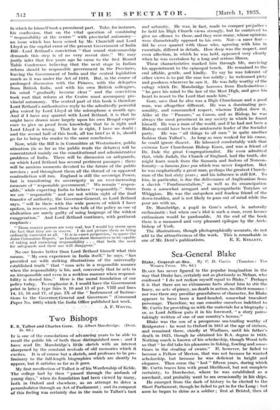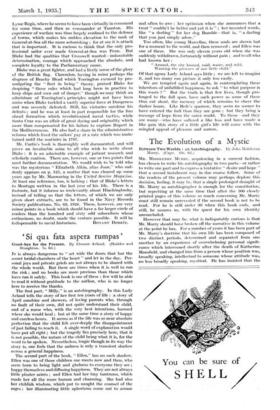Sea-General Blake
Blake, General-at-Sea. By C. D. Curtis. (Taunton : The Wessex Press. lbs. W.) BLAKE has never figured in the popular imagination in the way that Drake has; certainly not as gloriously as Nelson, who confessed " I do not reckon myself equal to Blake." Perhaps it is that there are no extraneous facts about him to stir the fancy, no acts of piracy, no death in action, no illicit romance : nor was there any peculiar gracefulness of character, for Blake appears to have been a hard-headed, somewhat truculent personage. Therefore, we can consider ourselves indebted to Mr. Curtis for providing us with the materials for a biography ; or, as Lord Jellicoe puts it in his foreword, " a story pains- takingly written of one of our country's heroes."
Blake was the son of a prosperous sea-trading worthy of Bridgwater : he went to Oxford in 1615 at the age of sixteen, and remained there, chiefly at Wadham, until his father's death in 1625, though he obtained his B.A. degree in 1618. Nothing much is known of his scholarship, though Wood tells us that " he did take his pleasures in fishing, fowling and some- times in the stealing of swans." If, however, he failed to become a Fellow of Merton, that was not because he wanted scholarship, but because he was deficient in height and elegance. Then come the " lost " fifteen years, during which Mr. Curtis traces him with great likelihood, but not complete certainty, to Dorchester, where he was established as a merchant, and probably went to sea occasionally in his ships.
He emerged from the dark of history to be elected to the Short Parliament; though he failed to get in for the Long : but soon he began to shine as a soldier ; first at Bristol, then at
Lyme Regis, where he seems to have been virtually in command for some time, and then as commander at Taunton. His experience of warfare was thus largely confined to the defence of towns, which makes his sudden elevation to the rank of General-at-Sea all the more astonishing ; for at sea it is attack that is important. It is curious to think that the only pro- fessional sailor ever made General-at-Sea was Penn. But Blake had the qualities that Cromwell wanted—indomitable determination, courage which approached the absolute, and complete loyalty to the Parliamentary cause.
Blake was a great fighter, and had a lively sense of the glory of the British flag. Clarendon, having in mina perhaps the disgrace of Beachy Head which Torrington excused by pro- mulgating the " fleet in being " theory, praised Blake for despising " those rules which had long been in practice to keep ships and men out of danger," though we may think art admixture of Torrington's principles might not have been amiss when Blake tackled a vastly superior force at Dungeness and was severely defeated. Still, his victories outshine his defeats ; and he was at least in part responsible for the line ahead formation which revolutionized naval tactics, while Santa Cruz was an affair of great daring and originality which more than compensated for his failure to capture Rupert in the Mediterranean. He also had a share in the administrative reforms which fixed the sailors' pay at a rate which was main- tained until the mutinies in 1797.
Mr. Curtis's book is thoroughly well documented, and will prove an invaluable mine to all who wish to write about Blake : it is an admirable example of patient research and scholarly caution. There are, however, one or two points that need further documentation. We would wish to be told who was the mysterious " Elizabeth Alkin, alias Joan," who sud- denly appears on p. 125, a matter that was cleared up some years ago by Mr. Manwaring in the United Service Magazine. At least one reference, too, is lacking : that of Blake's letters to Montagu written in the last year of his life. There is a footnote, but it informs us irrelevantly about Hinchingbroke, instead of telling us that the letters, of which we are only given short extracts, are to be found in the Navy Records Society publications, No. 63, 1928. These, however, are very minor points in a book which should have a far larger circle of readers than the hundred and sixty odd subscribers whose enthusiasm, no doubt, made the venture possible. It will be indispensable to naval historians. BONAMY DOBREE.



























































 Previous page
Previous page